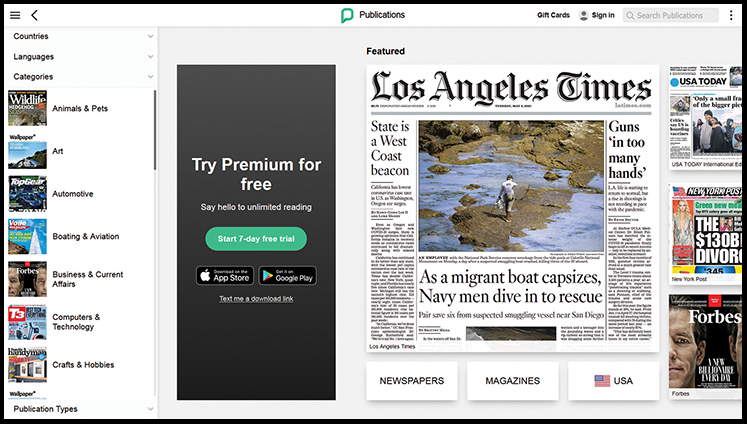PressReader | Reference eReviews
PressReader is a wonderful way to read the news. Simply and gracefully designed, it enables readers to search, browse, and page through interactive digital editions of thousands of newspapers and magazines from all over the world. With its limited date coverage and searchability, PressReader likely won’t appeal to researchers, but casual readers, language learners, travelers, businesspeople, and international students wishing to stay in touch with home will relish the global content and reading experience.
PressReader
CONTENT
Launched in 2003, PressReader is a wonderful way to read the news. Simply and gracefully designed, the resource enables readers to search, browse, and page through interactive digital editions of thousands of newspapers and magazines from all over the world. The most recent 90 days of each title are included—enough for casual information seekers, if not scholars.
Organizational subscribers experience PressReader as an all-you-can-read buffet—there are no limits on concurrent users or total views. Subscribers cannot pick and choose publications; one pricing option provides unlimited access to all content on the platform, including new titles as they are added. Notable periodicals are absent (the Wall Street Journal, the Financial Times, the New York Times), but users will find many significant ones (the Los Angeles Times, the Guardian, the New York Review of Books).
For many periodicals, multiple editions are available through PressReader; for Newsweek alone, users will find Baja Californian, Chinese, and Argentine, and Spanish editions.
Most content is in English, but PressReader’s scope is global and its languages diverse. French, Spanish, Turkish, and Ukrainian periodicals are well represented, even though many non-English titles are editions of Vogue or other popular U.S. magazines.
USABILITY
The reading experience is a pleasure, especially on a tablet device. Patrons can zoom in and out freely or toggle to text-only mode. By creating a personal PressReader account, users can save, print, or download entire pages or articles to keep indefinitely or share with others (who need not be a PressReader user to view the shared item).
Readers can browse by country (from Albania to Zimbabwe), language (from Afrikaans to Zulu), publication type (newspapers or magazines), and categories (news, business, cuisine, automotive, pets, sports, travel, fashion, fitness, LGTBQ, and more). Users can refine keyword searches by date (same day, last three days, past week, past month, anytime), author, publication, and language. The search engine is rudimentary but should suffice for the target audience of casual information seekers.
Interactive elements include a text-to-speech tool, which is accurate but computer-generated. Article text can be translated into 18 languages with a fair degree of accuracy. Readers can personalize their landing pages to get a continually updating feed of full-text articles tailored to their interests, location, and language preferences. Users can publicly comment on and upvote or downvote articles, and upload their own images to accompany their comments, which go live instantly when they’re submitted—a feature that could potentially be abused.
PRICING
Costs vary depending on factors such as population served; contact Allan Klassen (allank@pressreader.com) for more information.
VERDICT
With limited date coverage and searchability, PressReader likely won’t appeal to researchers, but casual readers, language learners, travelers, businesspeople, and international students wishing to stay in touch with home will relish the global content and reading experience.
Michael Rodriguez is Collections Strategist, University of Connecticut, Storrs.
RELATED
ALREADY A SUBSCRIBER? LOG IN
We are currently offering this content for free. Sign up now to activate your personal profile, where you can save articles for future viewing










Add Comment :-
Comment Policy: